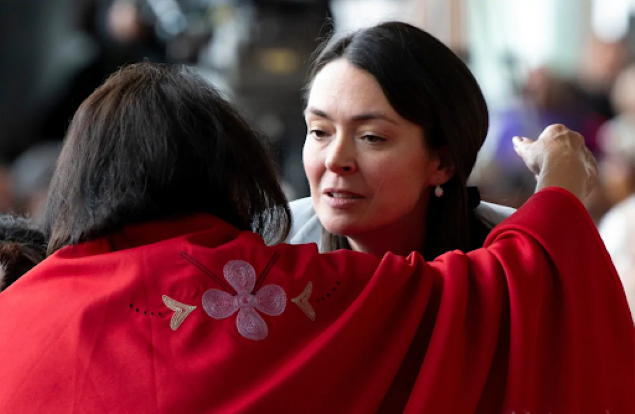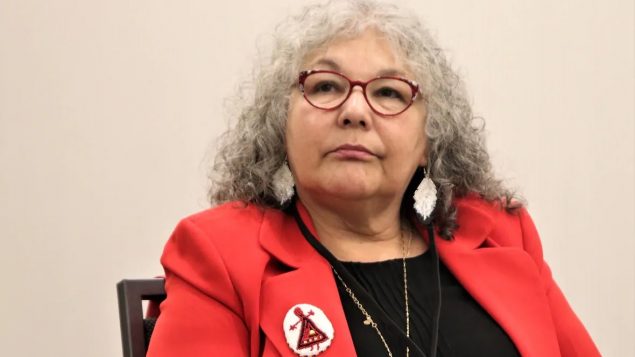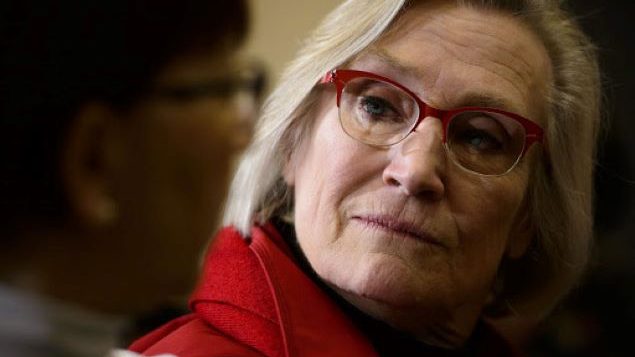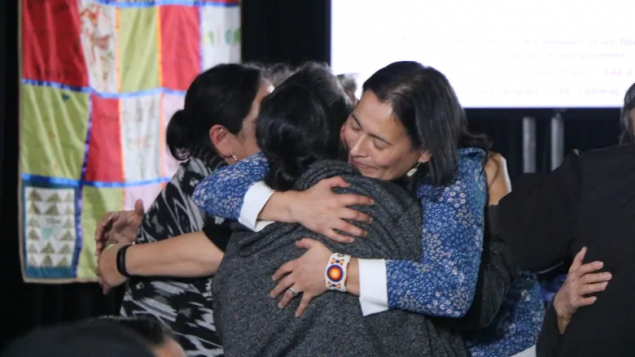The Native Women’s Association of Canada has issued a failing report card to Ottawa to mark the one year anniversary of the release of National Inquiry into Missing and Murdered Indigenous Women and Girls, published on June 3 of last year.
The report called the disappearance and murder of thousands of Indigenous women and girls a “Canadian genocide” and listed 231 ‘imperative changes’ that needed to be taken by governments and Canadians.

The faces of some of the Indigenous women and girls who have vanished or have been murdered in Canada in recent decades. (CBC News)
“It must be understood that these recommendations, which we frame as ‘Calls for Justice,’ are legal imperatives – they are not optional,” the report reads.
The commission’s recommendations for action addressed themes of health, justice, security and culture, including overcrowding and food insecurity for women in Indigenous communities, and more funding for women’s shelters.

A woman embraces commissioner Qajaq Robinson during the closing ceremonies for the National Inquiry into Missing and Murdered Indigenous Women and Girls, published on June 3 of last year. (Adrian Wyld/THE CANADIAN PRESS)
A national action plan — with Ottawa working with provinces, territories, Indigenous leaders, families and women’s groups – was at the top of the list.
In early May, Indigenous groups pleaded with Ottawa to fast-track the action plan because they said the stress of the COVID-19 pandemic had resulted in an increase in violence against many Indigenous women and girls.
On Wednesday, Lorraine Whitman, president of the Native Women’s Association of Canada, issued her organization’s own action plan.

Lorraine Whitman, president of the Native Women’s Association of Canada, is on the front lines of the fight to get Ottawa to move on an action plan to implement the recommendations of the Inquiry into Missing and Murdered Indigenous Women and Girls. (Nic Meloney/CBC)
“I’m really disappointed in the process because it’s lack-of,” Whitman told Olivia Stefanovich of CBC News.
“But saying that, I do hope that they’ll start proceeding.”
NWAC, the most prominent Indigenous women’s organization in the country, gave Canada a failing grade in four evaluated areas: culture, health, security and the right to justice.
Among its requests, NWAC is asking Ottawa to immediately:
- Create a national task force with independent investigators to review unresolved files of missing and murdered Indigenous women and girls.
- Develop a national database of cases.
- Appoint an independent mechanism to report to Parliament annually on implementation of recommendations.
- Establish a national campaign to prevent racism and sexualized stereotypes.
Stefanovich writes that “the organization also wants to be at all decision-making tables with the federal government on issues related to Indigenous women, girls and gender-diverse people. It is also looking for financial resources to create its own awareness campaign and an internal unit to work on the recommendations.”
In an interview with CBC News, Minister Bennett said the federal government and its partners are working as quickly as they can to develop a coordinated strategy for the families of missing and murdered Indigenous women and girls.

Carolyn Bennett, then the Indigenous and Northern Affairs Minister, takes part in an official apology to Inuit for the federal government’s management of tuberculosis in the Arctic from the 1940s to the 1960s, in Iqaluit, Nunavut, on March 8, 2019. Bennett says First Nations women and their descendants will be able to obtain equal status and category of membership as the First Nations men and their descendants. (Sean Kilpatrick/THE CANADIAN PRESS)
Bennett told Stefanovich the federal government is still consulting with Indigenous women’s groups, Indigenous leadership and provincial and territorial governments on the co-development of a national action plan to address the inquiry’s 231 recommendations, even though the pandemic has prevented in-person meetings.
Ottawa, Stefanovich reports, is also highlighting work already done in response to the inquiry in a new website, which promotes federal legislation to protect Indigenous languages and an overhaul of the child welfare system among its key responses.
“We won’t let them down,” Bennett told Stefanovich.
“I think that we’ve got some excellent building blocks toward a national action plan.”
With files from CBC News (Olivia Stefanovich, Jorge Barrera), RCI







For reasons beyond our control, and for an undetermined period of time, our comment section is now closed. However, our social networks remain open to your contributions.